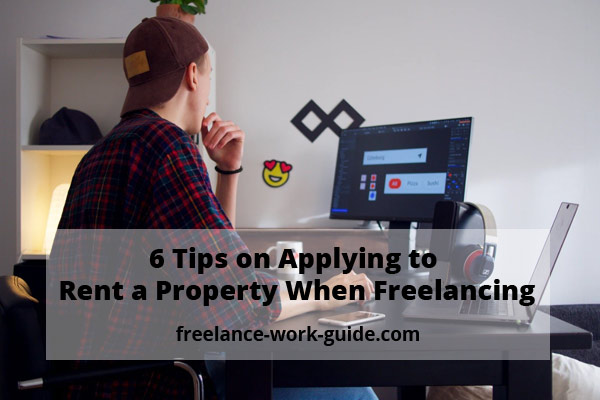
With a little planning and forethought, it is possible to rent a property or apartment when you work as a freelancer. These six tips will help you organize, apply, and get the residence you want.
1. Financial Records
When you work as a freelancer it is important to keep impeccable records of your financial activity. This is something you will have to begin before you send in an application to rent a property.
You will commonly need three months of bank statements although some landlords will request six to twelve. Do not take this request personally; it is expensive for a landlord to rent and re-rent a unit because a tenant is financially insolvent.
Be prepared to provide your tax returns for three years as historic proof of income. It is also a good idea to prove you have up to three months’ rent in a savings account.
Some people put three months’ rent in an escrow account to prove to the potential landlord that there is money available to pay rent. Most rentals require a deposit and a special deposit if you have a pet in addition to the first and last months’ rent in escrow. This will depend on the market in your area.
2. Credit Score
Your credit score will be a major factor for a landlord to decide to rent to you. A credit score is a number from 300-850 that shows a person’s creditworthiness. The score is based on credit history that includes the number and type of accounts you have, the total level of debt and the repayment history.
Some of the ways you can improve your credit score include repaying loans on time and keeping your debt low. If you have a score of 640 or lower, it is time to begin improvements. Less than 640 points is considered sub-prime and may mean you will need a co-signer to secure a rental property.
If a landlord is willing to work with someone whose credit score is below 640, they may require a larger deposit or an escrow account for a few months’ rent.
The three main credit reporting agencies in the U.S. are Experian, Equifax, and Transunion and all three report, update, and store consumer credit history. The five factors that influence the numbers being reported are:
- Payment history–35%
- Total amount owed–30%
- Length of credit history–15%
- Types of credit–10%
- New credit–10%
3. Where and What Can I Rent?
Everyone has the ideal rental property in mind once they have made the decision to move but flexibility is the key to lessen your chances of disappointment and frustration when looking for that perfect space.
As a freelance worker you may not be eligible to rent at larger complexes. Specific regulations for employment verification are usually put in place by the owner’s group and the manager may not have the authority to override those protocols.
Instead look for smaller units or duplexes, once you fully understand what you can afford. You will have a better shot at convincing a landlord you are going to be a great tenant if they have a stake in the property and can make decisions by themselves.
Look for independent owners or managers of smaller properties and use your network of friends and family to alert you when a desirable place becomes available.
4. Meeting the Potential Landlord
The adage, “Never judge a book by its cover” does not apply to your first meeting with a potential landlord. Working as a freelancer affords you a lot of flexibility in the way you dress, particularly if you work from home.
Wearing a nice shirt with pajama bottoms will not make you look professional even though that may be the way you dress for most workdays. Take the time to get dressed properly in business casual attire at the least.
Keep in mind that meetings might have to be taken via Zoom or Facetime and virtual apartment tours might be your best bet during these uncertain times.
The first impression you make will have a great deal to do with whether you get a place or not. A potential landlord will make subconscious judgements about you by the way you present yourself, regardless of how many months’ rent you have in escrow.
In general, landlords perceive slovenly appearances as a sign of how their place will be maintained.

5. Once You Meet
By the time you physically meet your potential landlord you will have already discussed things like rent and utilities and other aspects of the property. This is the time to sell yourself as a tenant. Let them know how you will be an asset to their property.
Can you mow the lawn or shovel snow? Do you like gardening? Ask if there are other things you could do to facilitate maintenance of the home. Explain that you are a person who appreciates cleanliness and tidiness in your home.
These are all things you can say to endear yourself to a landlord. If pets are allowed, tell your landlord about your pet, and assure them that you are a considerate pet owner.
Be aware that in general there will be an additional fee, to be paid with the deposit, to have a pet. This is a normal fee to offset the costs of pet damage. You may not be aware that Fluffy is missing his litter box, but the next tenant will.
6. Other Possibilities
If your credit score is not high enough to satisfy a potential landlord, you may be asked to provide a co-signer. This is a financially responsible person like a parent or other relative, who will assume responsibility for your rent should you be unable to pay.
The landlord will ask for financial information from your co-signer. You may also be asked to provide a list of clients or standing contracts to prove you are able to pay the rent. Anyone can say they are freelancing but a show of contracts will prove you do have work.
Another possibility is to have a roommate who has a regular job. There are pros and cons to having a roommate but ultimately it can save you money.
When you work on a contract basis for a variety of companies as a freelancer you retain the freedom to choose your projects. You are self-employed and as such you will be responsible for maintaining exacting financial records for yourself.
With good records of completed and future contracts and a good credit score your chances of renting the perfect place to live will improve.
BIO:
This is a contributors article from Sam Radbil from https://www.abodo.com/ which is an online apartment search company based in Madison, Wisconsin.















